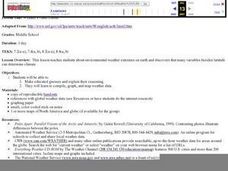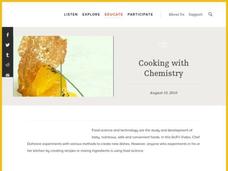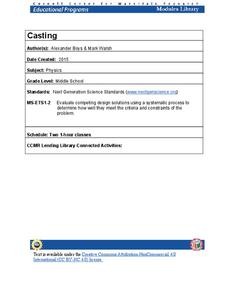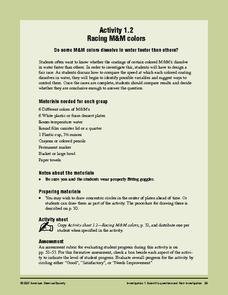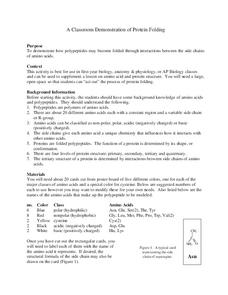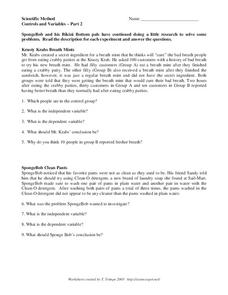Curated OER
Introduction to Scientific Investigation
What is a scientific investigation? What are the various parts of an experiment? This instructional activity provides a basic review of most key terms: scientific method, manipulated variable, responding variable, hypothesis, controlled...
Curated OER
Celery Lab
How do sugar and salt affect celery's mass, width, and flexibility? Using simple household ingredients, young scientists will perform a controlled experiment to find out. The lab is scaffolded through a activity, but there are no other...
Curated OER
Weather's Outer Limits
Students make educated guesses and explain their reasoning and compile, graph, and map weather data. They then study environmental weather extremes on earth and discover that many variables determine climate.
Ed Migliore
Linear Equations in Two Variables
This traditional textbook style unit includes vocabulary, a direct explanation section, examples, practice problems that directly line up with the explanations and examples, and a unit summary review and practice problems. Learners get...
Science Friday
Cooking with Chemistry
Use class time to perfect your hollandaise sauce with a chemistry lesson. It includes two activities to teach about immiscible liquids, emulsifiers, and creating a stable homogenous mixture. Young scientists first mix...
NASA
Newton Car
If a car gets heavier, it goes farther? By running an activity several times, teams experience Newton's Second Law of Motion. The teams vary the amount of weight they catapult off a wooden block car and record the distance the...
Cornell University
Casting
Don't cast a great hands-on resource aside! Scholars learn about the process of casting by actually trying out an example. Plaster of Paris and cookie cutter molds help them complete the activity.
Howard Hughes Medical Institute
Gorongosa: Scientific Inquiry and Data Analysis
How does the scientific process begin? Introduce ecology scholars to scientific inquiry through an insightful, data-driven lesson. Partners examine data from an ongoing research study to determine the questions it answers. The resource...
Foundation for Water & Energy Education
How Can Work Be Done with Water Power? Activity C
Third in a set of lessons regarding reservoirs, dams, and hydropower, this involves a two-day hydropower plant simulation. Collaborative groups build, maintain, and finance the plant. The transparency of the reservoir setup can be...
American Chemical Society
Racing M&M Colors
More than anything, this is great practice in scientific inquiry. After discovering that the color coating of an M&M® dissolves in water during a preceding activity, investigators now question whether or not the color makes a...
Southwestern Medical Center
A Classroom Demonstration of Protein Folding
Does the mention of proteins and polypeptide relationships in your classroom result in mass confusion? Does the attempt to teach this important concept generate multiple questions and, at times, lead to a room filled with blank...
LABScI
Conservation of Momentum: Marble Collisions
What happens to the momentum of an object when it strikes another object? Scholars roll a marble down a ramp so it collides with another marble. By measuring the speed of each marble before and after the collision, pupils answer this...
Chemistry Collective
Osmotic Pressure: Spontaneous Balloon Popping
Visualize osmosis using an interactive activity. As learners monitor a simulation, they witness the particle movement through the membrane. A balloon represents the cellular membrane and 'pops' as osmosis creates an imbalance of...
GLOBE Program
Calculating Relative Air Mass
Combine math and science with fun in the sun! Scientists build a solar gnomon using reusable materials to calculate relative air mass. Mathematicians measure the pole's shadow and use the data to solve for relative air mass....
Curated OER
WS 7.4 Ideal Gas Law
For this ideal gas law worksheet, students solve eighteen problems using the ideal gas law to solve for moles of gases, temperature of gases, pressure of gases or volumes of gases.
101 Questions
Falling Rocks
Can you determine how far down a rock drops without visual clues? Viewers observe a clip from a movie testing vertical distance only based on sound. They must determine if it is safe to drop down themselves or if it is farther than their...
Learning Games Lab
Testing for Corn Mold
Learners complete a virtual lab to test for a corn mold that can lead to dangerous toxins. They walk through a detailed step-by-step procedure then see their findings. Throughout the activity, they learn how to use lab tools and practice...
Radford University
Mathematical Modeling: Lesson 1
Will more deer result in more big game licenses? Scholars first research data on the number of deer and the number of big game licenses in Virginia between 1990 to 2009. They apply polynomial, exponential, and logarithmic regression to...
Bonneville
Compost Bioreactor Design
Organic waste is a hot topic. The second of three installments in the Bioreactor Water Heating unit challenges pupils to create bioreactors that collect energy released from compost. After watching videos on the properties of water and...
Curated OER
Doing Science: Computer Models
In this computer models worksheet, students read information about how scientists use computer models to advance the work of science. Students also answer a critical thinking question comparing computer simulations to direct observations.
Curated OER
Emotional Speed with Balls and Ramps
Fifth graders investigate the relationship between mass and speed. In this physics lesson, 5th graders experiment with motion by being given a ramp, two balls, and blocks or books for elevation. Students determine how different variables...
Curated OER
Understanding Symbols
In this symbols activity, students read about how different symbols are used to represent variables or constants in equations. Then students complete 3 problems.
Curated OER
Freshman Project-Part 1B Four Questions Strategy
In this project worksheet, students answer four questions about their experimental design. This includes their materials available, the action of their materials and their independent and dependent variable.
Curated OER
Scientific Method
In this Scientific Method worksheet, students identify controls, variables and conclusions given experiment descriptions. Students interpret data given in charts.
Other popular searches
- Variables in Science
- Variables Science
- Science Variables Game
- Variables Science Quiz
- Catapults Science Variables
- Practicing Science Variables
- Identifying Science Variables
- Physical Science Variables
- Identifing Science Variables
- Science Variables Worksheets




